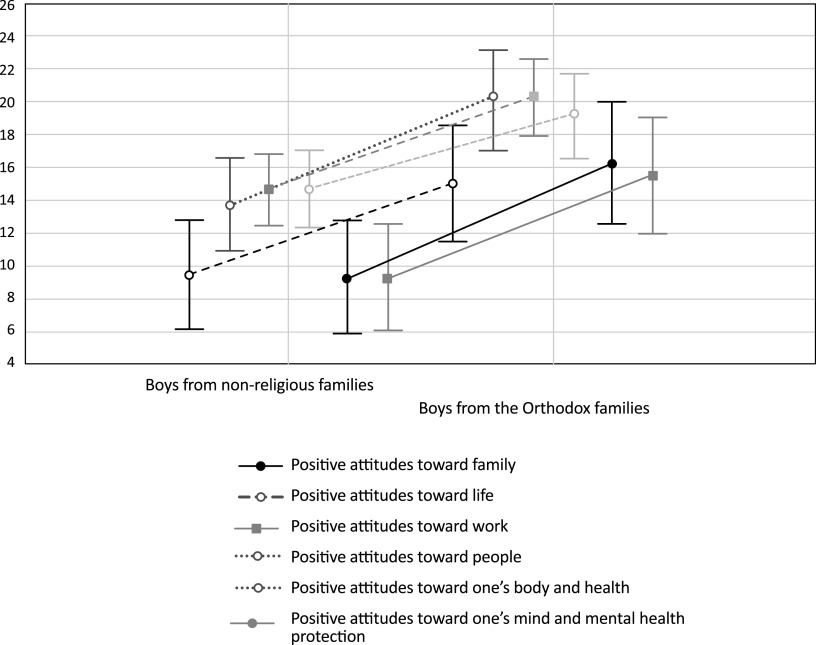宗教性与非宗教性家庭男孩心理健康态度的差异
IF 1.1
Q3 PSYCHOLOGY, MULTIDISCIPLINARY
引用次数: 0
摘要
背景:后工业社会面临着环境和生物方面的多重压力和发展风险。心理健康问题已经变得更加引人注目,并成为辩论的主题。当前关于宗教-心理健康关系的论述使得研究经历宗教和世俗教育的宗教和非宗教家庭的儿童对心理健康的态度差异具有重要意义和相关性。目的:研究接受宗教和世俗教育的东正教和非宗教家庭儿童对不同生活领域的态度。我们假设东正教家庭和非宗教家庭的儿童对心理健康的态度存在差异,而不考虑学校的选择。我们期望接受宗教和世俗教育的儿童对心理健康的积极态度更大。设计:我们的研究对340名小学生进行了一系列的评估。这些男孩的平均年龄为10.4岁。考虑到家庭的宗教信仰和教育特征,参与者被分为三组。结果:来自东正教家庭的男孩对家庭、生活、人、身体和心理健康的态度比非宗教家庭的男孩更积极。这些差异在接受世俗教育的宗教和非宗教家庭的男孩群体之间也很显著。接受过宗教教育的宗教家庭男孩对身心健康的态度比接受过世俗教育的宗教家庭男孩更积极。结论:有宗教信仰的家庭更容易形成积极的身心健康态度。本文章由计算机程序翻译,如有差异,请以英文原文为准。

Differences in Attitudes toward Mental Health among Boys from Religious and Non-religious Families Experiencing Religious and Secular Education.
Background Post-industrial society faces multiple stresses and developmental risks, both environmental and biological. The issues of mental health have become more dramatic and subject to debate. The current discourse about the religiosity-mental health nexus makes the study of differences in attitudes towards mental health among children from religious and non-religious families experiencing religious and secular education significant and relevant for practice. Objective We studied the attitudes toward different spheres of life of children from Orthodox and non-religious families experiencing religious and secular education. We hypothesized differences in attitudes toward mental health by children from Orthodox families and non-religious families regardless of school choice. We expected the positive attitudes toward mental health to be greater for the children experiencing religious and secular education. Design Our study assessed 340 primary school boys on a number of measures. The boys’ average age was 10.4 years old. The participants were divided into three groups, taking into consideration the family’s religiosity and educational characteristics. Results The boys from Orthodox families had more positive attitudes toward family, life, people, their bodies, and their mental health than the boys from nonreligious families. These differences were also significant between groups of boys from religious and non-religious families experiencing secular education. The boys from religious families experiencing religious education had more positive attitudes toward their physical and mental health than the boys from religious families experiencing secular education. Conclusion Positive attitudes toward both physical and mental health are more likely to be formed within religious families.
求助全文
通过发布文献求助,成功后即可免费获取论文全文。
去求助
来源期刊

Psychology in Russia-State of the Art
PSYCHOLOGY, MULTIDISCIPLINARY-
CiteScore
2.00
自引率
11.10%
发文量
11
审稿时长
14 weeks
期刊介绍:
Established in 2008, the Russian Psychological Society''s Journal «Psychology in Russia: State of the Art» publishes original research on all aspects of general psychology including cognitive, clinical, developmental, social, neuropsychology, psychophysiology, psychology of labor and ergonomics, and methodology of psychological science. Journal''s list of authors comprises prominent scientists, practitioners and experts from leading Russian universities, research institutions, state ministries and private practice. Addressing current challenges of psychology, it also reviews developments in novel areas such as security, sport, and art psychology, as well as psychology of negotiations, cyberspace and virtual reality. The journal builds upon theoretical foundations laid by the works of Vygotsky, Luria and other Russian scientists whose works contributed to shaping the psychological science worldwide, and welcomes international submissions which make major contributions across the range of psychology, especially appreciating the ones conducted in the paradigm of the Russian psychological tradition. It enjoys a wide international readership and features reports of empirical studies, book reviews and theoretical contributions, which aim to further our understanding of psychology.
 求助内容:
求助内容: 应助结果提醒方式:
应助结果提醒方式:


